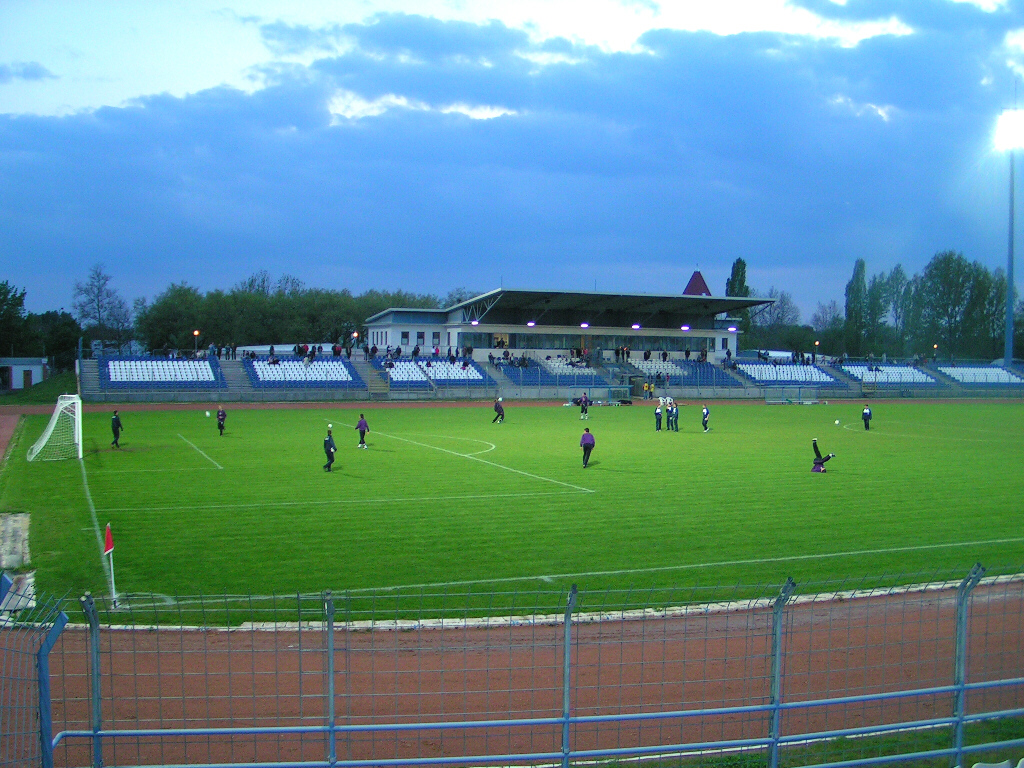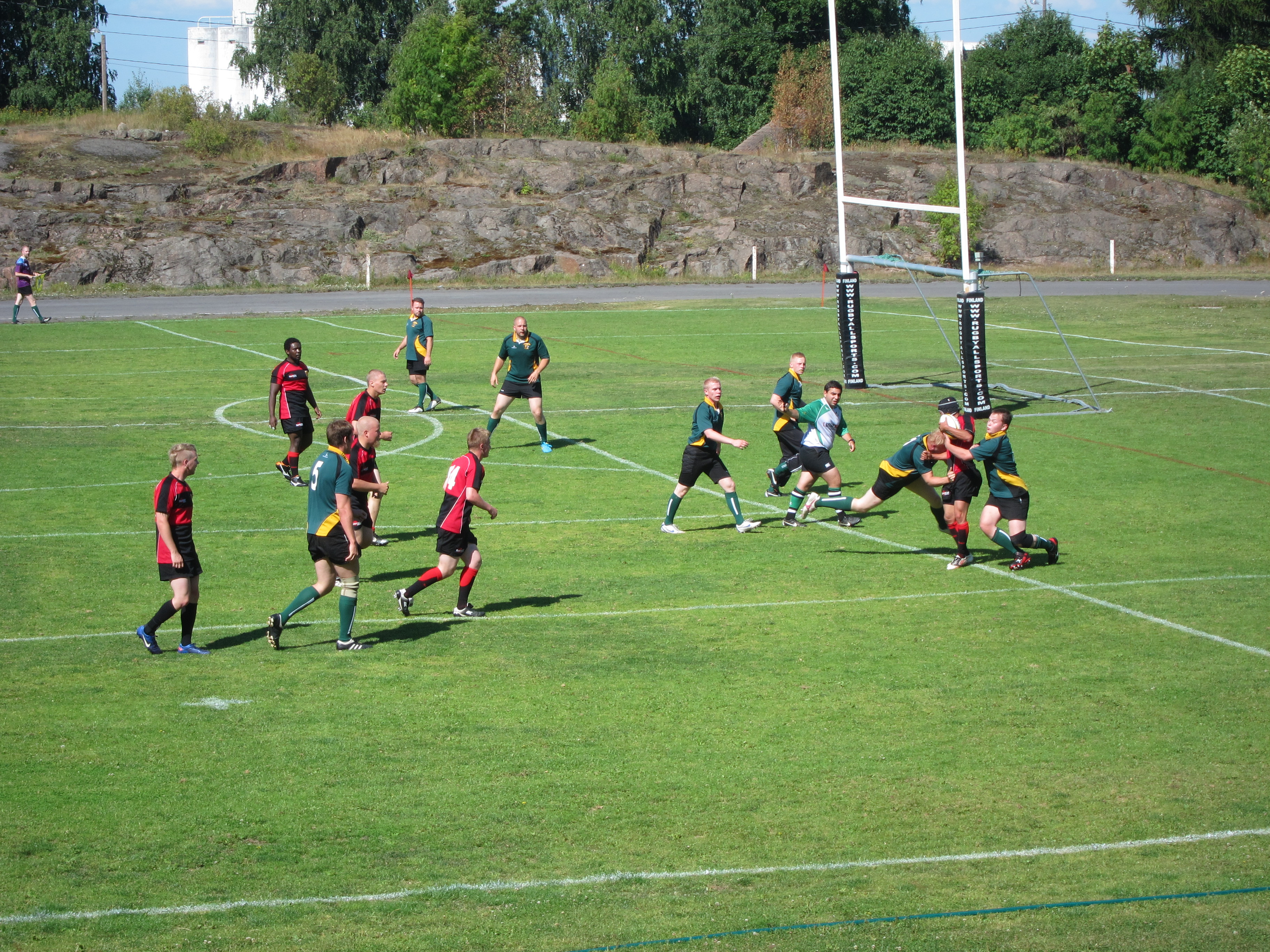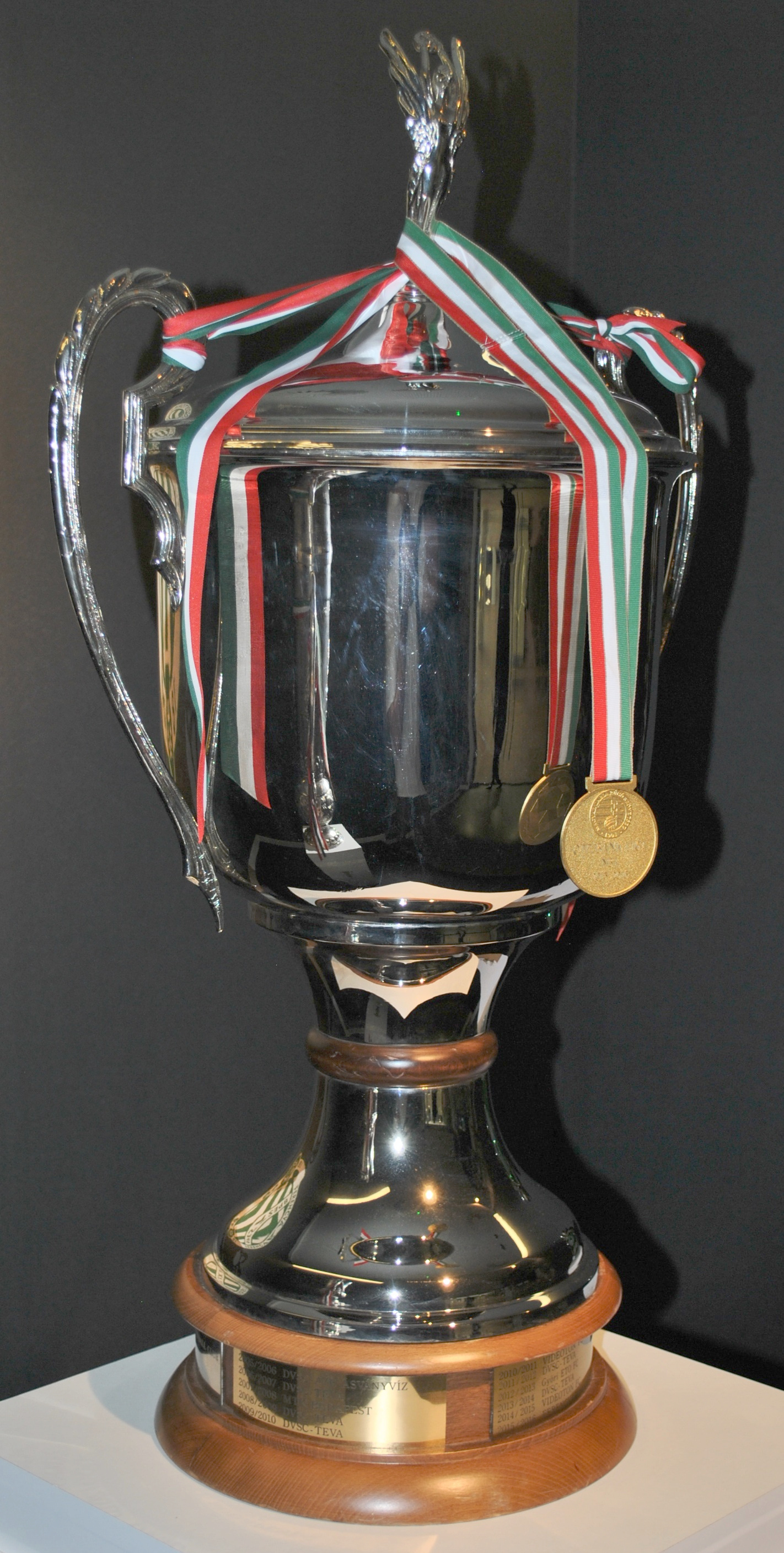|
Széktói Stadion
Széktói Stadion is a multi-use stadium in Kecskemét, Hungary. It is currently used mostly for football and rugby matches, and is the home stadium of Kecskeméti TE of the Hungarian National Championship I and of Kecskeméti Atlétika és Rugby Club of the Nemzeti Bajnokság I. With 4,300 seats, and standing room for 2,000, the stadium is able to hold 6,300 spectators. History The stadium was built in 1962, with the help of several locals. It was renovated in 2002. The new lighting installation was finished in 2008, after the club's promotion to the NB I, the top league of Hungarian football. On 15 August 2012 Tunisia draw here with Iran Iran, officially the Islamic Republic of Iran, and also called Persia, is a country located in Western Asia. It is bordered by Iraq and Turkey to the west, by Azerbaijan and Armenia to the northwest, by the Caspian Sea and Turkmeni ... 2–2 in friendly match. It was the first game between these two teams. References ... [...More Info...] [...Related Items...] OR: [Wikipedia] [Google] [Baidu] |
Kecskemét
Kecskemét ( , sk, Kečkemét) is a city with county rights central part Hungary. It is the eighth-largest city in the country, and the county seat of Bács-Kiskun. Kecskemét lies halfway between the capital Budapest and the country's third-largest city, Szeged, from both of them and almost equal distance from the two big rivers of the country, the Danube and the Tisza. It is the northern of two centres of the Hungarian Southern Great Plain (Hungarian: Dél-Alföld) region (comprising the three counties Bács-Kiskun, Békés and Csongrád); the southern centre is Szeged, the seat of Csongrád county. Etymology The name of the city stems from the Hungarian word ''kecske'' meaning "goat" and ''-mét'' meaning "pass". Geography Kecskemét was established at the meeting point of a large sandy region and a sandy yellow soil; its elevation is above sea level. The territory west of the city is covered by wind-blown sand, characterised by the almost parallel northern-southern ... [...More Info...] [...Related Items...] OR: [Wikipedia] [Google] [Baidu] |
Hungary
Hungary ( hu, Magyarország ) is a landlocked country in Central Europe. Spanning of the Carpathian Basin, it is bordered by Slovakia to the north, Ukraine to the northeast, Romania to the east and southeast, Serbia to the south, Croatia and Slovenia to the southwest, and Austria to the west. Hungary has a population of nearly 9 million, mostly ethnic Hungarians and a significant Romani minority. Hungarian, the official language, is the world's most widely spoken Uralic language and among the few non-Indo-European languages widely spoken in Europe. Budapest is the country's capital and largest city; other major urban areas include Debrecen, Szeged, Miskolc, Pécs, and Győr. The territory of present-day Hungary has for centuries been a crossroads for various peoples, including Celts, Romans, Germanic tribes, Huns, West Slavs and the Avars. The foundation of the Hungarian state was established in the late 9th century AD with the conquest of the Carpathian Basin by Hungar ... [...More Info...] [...Related Items...] OR: [Wikipedia] [Google] [Baidu] |
Kecskeméti TE
Kecskeméti Testedző Egyesület, commonly known as Kecskeméti TE or simply Kecskemét, is a sports club based in Kecskemét, Hungary. It is most famous for its football team which competes in the Nemzeti Bajnokság I, the first tier of Hungarian football. Kecskeméti TE's highest achievement to-date is winning the Magyar Kupa in the 2010–11 season, and gaining entry into the Europa League. History Early years Pages of Kecskemét wrote on 6 May 1871, "company wants to play soccer in our city into an older fellow-citizens, which the company exercised twice a week he throws up and running." This experiment, however, proved unsuccessful. In 1904, they played the first football match in Kecskemét, against Budapest III. District High School defeated the team of local Piarist High School. In May 1910, the first football game between the clubs was held in Kecskemét. The club was founded on 11 June 1911, and attracted primarily local workers as players in the early years. The fi ... [...More Info...] [...Related Items...] OR: [Wikipedia] [Google] [Baidu] |
Kecskeméti Atlétika és Rugby Club
Kecskeméti Atlétika és Rugby Club is a Hungarian rugby club in Kecskemét Kecskemét ( , sk, Kečkemét) is a city with county rights central part Hungary. It is the eighth-largest city in the country, and the county seat of Bács-Kiskun. Kecskemét lies halfway between the capital Budapest and the country's th .... They currently play in the Extraliga. History The club was founded in the spring of 1979 by a couple of students and teachers at the Kecskeméti Gépipari és Automatizálási Műszaki Főiskola (Kecskemét College of Engineering and Automation Technology). This makes KARC the oldest rugby club still playing in the league. The club has been in its present form since 1996, when the Kecskeméti Sport Club merged with the rugby club. It won the national championship in 1998. Historical names * 1979 - Kecskeméti GAMF (Kecskeméti Gépipari és Automatizálási Műszaki Főiskola) * 1995 – Kecskeméti RC (Kecskeméti Rugby Club) * 1996 – Kecskeméti ARC ... [...More Info...] [...Related Items...] OR: [Wikipedia] [Google] [Baidu] |
Stadium
A stadium ( : stadiums or stadia) is a place or venue for (mostly) outdoor sports, concerts, or other events and consists of a field or stage either partly or completely surrounded by a tiered structure designed to allow spectators to stand or sit and view the event. Pausanias noted that for about half a century the only event at the ancient Greek Olympic festival was the race that comprised one length of the stadion at Olympia, where the word "stadium" originated. Most of the stadiums with a capacity of at least 10,000 are used for association football. Other popular stadium sports include gridiron football, baseball, cricket, the various codes of rugby, field lacrosse, bandy, and bullfighting. Many large sports venues are also used for concerts. Etymology "Stadium" is the Latin form of the Greek word " stadion" (''στάδιον''), a measure of length equalling the length of 600 human feet. As feet are of variable length the exact length of a stadion depends on the ... [...More Info...] [...Related Items...] OR: [Wikipedia] [Google] [Baidu] |
Football (soccer)
Association football, more commonly known as football or soccer, is a team sport played between two teams of 11 players who primarily use their feet to propel the ball around a rectangular field called a pitch. The objective of the game is to score more goals than the opposition by moving the ball beyond the goal line into a rectangular framed goal defended by the opposing side. Traditionally, the game has been played over two 45 minute halves, for a total match time of 90 minutes. With an estimated 250 million players active in over 200 countries, it is considered the world's most popular sport. The game of association football is played in accordance with the Laws of the Game, a set of rules that has been in effect since 1863 with the International Football Association Board (IFAB) maintaining them since 1886. The game is played with a football that is in circumference. The two teams compete to get the ball into the other team's goal (between the posts and under t ... [...More Info...] [...Related Items...] OR: [Wikipedia] [Google] [Baidu] |
Rugby Football
Rugby football is the collective name for the team sports of rugby union and rugby league. Canadian football and, to a lesser extent, American football were once considered forms of rugby football, but are seldom now referred to as such. The governing body of Canadian football, Football Canada, was known as the Canadian Rugby Union as late as 1967, more than fifty years after the sport parted ways with rugby rules. Rugby football started about 1845 at Rugby School in Rugby, Warwickshire, England, although forms of football in which the ball was carried and tossed date to the Middle Ages (see medieval football). Rugby football spread to other Public school (United Kingdom), English public schools in the 19th century and across the British Empire as former pupils continued to play it. Rugby football split into two codes in 1895, when twenty-one clubs from the North of England left the Rugby Football Union to form the Rugby Football League, Northern Rugby Football Union (renamed ... [...More Info...] [...Related Items...] OR: [Wikipedia] [Google] [Baidu] |
Hungarian National Championship I
Hungarian may refer to: * Hungary, a country in Central Europe * Kingdom of Hungary, state of Hungary, existing between 1000 and 1946 * Hungarians, ethnic groups in Hungary * Hungarian algorithm, a polynomial time algorithm for solving the assignment problem * Hungarian language, a Finno-Ugric language spoken in Hungary and all neighbouring countries * Hungarian notation, a naming convention in computer programming * Hungarian cuisine Hungarian or Magyar cuisine is the cuisine characteristic of the nation of Hungary and its primary ethnic group, the Magyars. Traditional Hungarian dishes are primarily based on meats, seasonal vegetables, fruits, bread, and dairy products. ..., the cuisine of Hungary and the Hungarians See also * * {{disambiguation Language and nationality disambiguation pages ... [...More Info...] [...Related Items...] OR: [Wikipedia] [Google] [Baidu] |
Nemzeti Bajnokság I (Rugby Union)
The Nemzeti Bajnokság (, "National Championship"), also known as NB I, is the top level of the Hungarian football league system. The league is officially named OTP Bank Liga after its title sponsor OTP Bank. UEFA currently ranks the league 28th in Europe. Twelve teams compete in the league, playing each other three times, once at home, once away, and the third match is played at the stadium that the last match was not played at. At the end of the season, the top team enters the qualification for the UEFA Champions League, while the runner-up and the third place, together with the winner of the Magyar Kupa enter the UEFA Europa Conference League qualification rounds. The bottom two clubs are relegated to Nemzeti Bajnokság II, the second-level league, to be replaced by the winner and the runner up of the NB2. History The first championship in 1901 was contested by BTC, MUE, FTC, Műegyetemi AFC, and Budapesti SC, with the latter winning the championship. Although the two fir ... [...More Info...] [...Related Items...] OR: [Wikipedia] [Google] [Baidu] |
NB I
NB, Nb, or nb may refer to: Arts and entertainment * ''N.B.'' (album), an album by Natasha Bedingfield * ''NB'' (TV programme), a Scottish arts television programme that aired 1989–1997 Businesses * NB Global, a British investment company * New Balance, a shoe company * Nigerian Breweries, a beverage company * Sterling Airlines, a defunct Danish airline (IATA designator) * National bank (other) several banks Language * ''Nota bene'', often abbreviated as NB or n.b., a Latin phrase meaning "note well" * nb, ISO 639-1 code for Bokmål, the written standard of the Norwegian language * (niúbī), a common word in Mandarin Chinese profanity Places * New Brunswick, a province of Canada, (postal abbreviation: NB) * Nebraska, US, (former postal abbreviation: NB; changed to NE) Science and technology * Niobium, symbol Nb, a chemical element * NB class, Australian steam locomotives * Boeing NB, a 1923 training aircraft * Naive Bayes classifier, in statistics * Neurob ... [...More Info...] [...Related Items...] OR: [Wikipedia] [Google] [Baidu] |
Tunisia National Football Team
The Tunisia national football team ( ar, منتخب تونس لكرة القدم; ) represents Tunisia in men's international association football. The team is a member of both FIFA and CAF, the Confederation of African Football. It is governed by the Tunisian Football Federation, founded in 1957. Colloquially known as the Eagles of Carthage, the team's colours are red and white, and the bald eagle is its symbol. Most of Tunisia's home matches are played at the Stade Olympique de Radès in Radès since 2001. Jalel Kadri has been coaching the team since 30 January 2022. Tunisia have made six FIFA World Cups and twenty Africa Cup of Nations tournaments, and participated in four editions of the Olympic football tournaments. Tunisia qualified for the 1978 World Cup, when it became the first African and Arab team to win a World Cup match by defeating Mexico. Though Tunisia is one of the most competitive African national teams in international football, having won one African Cup o ... [...More Info...] [...Related Items...] OR: [Wikipedia] [Google] [Baidu] |





